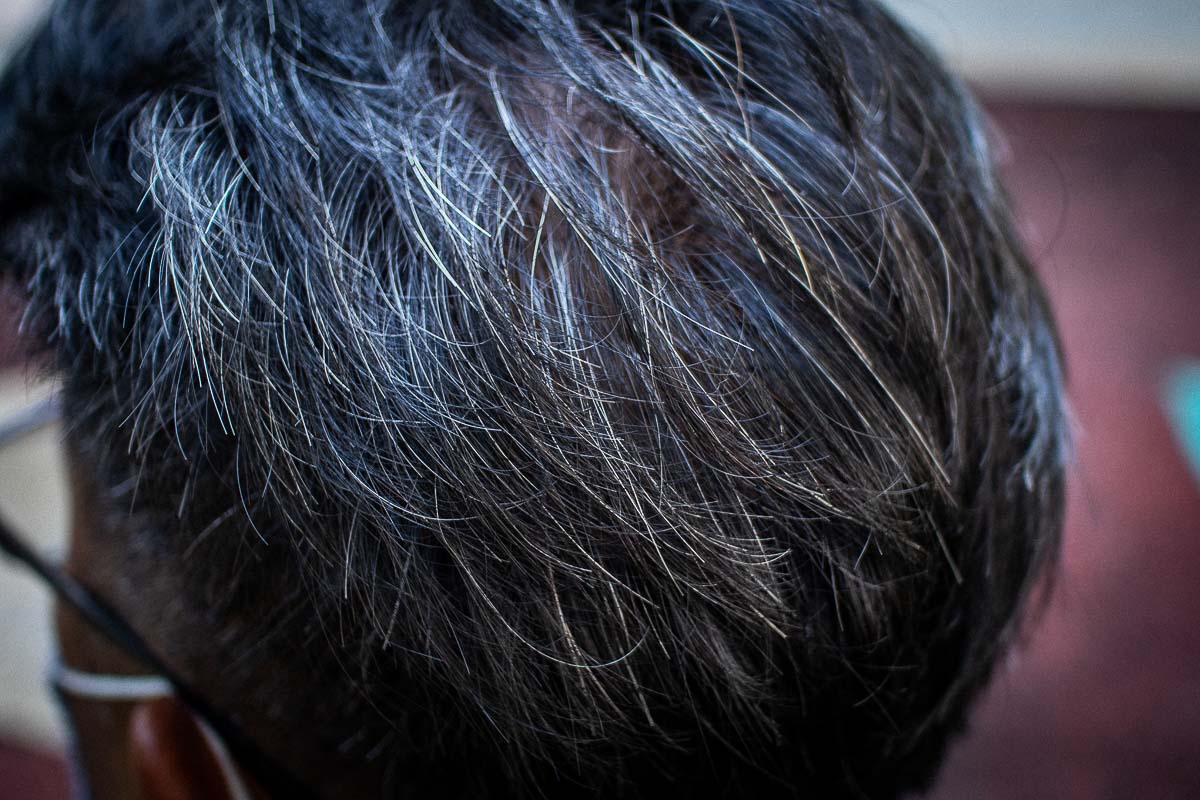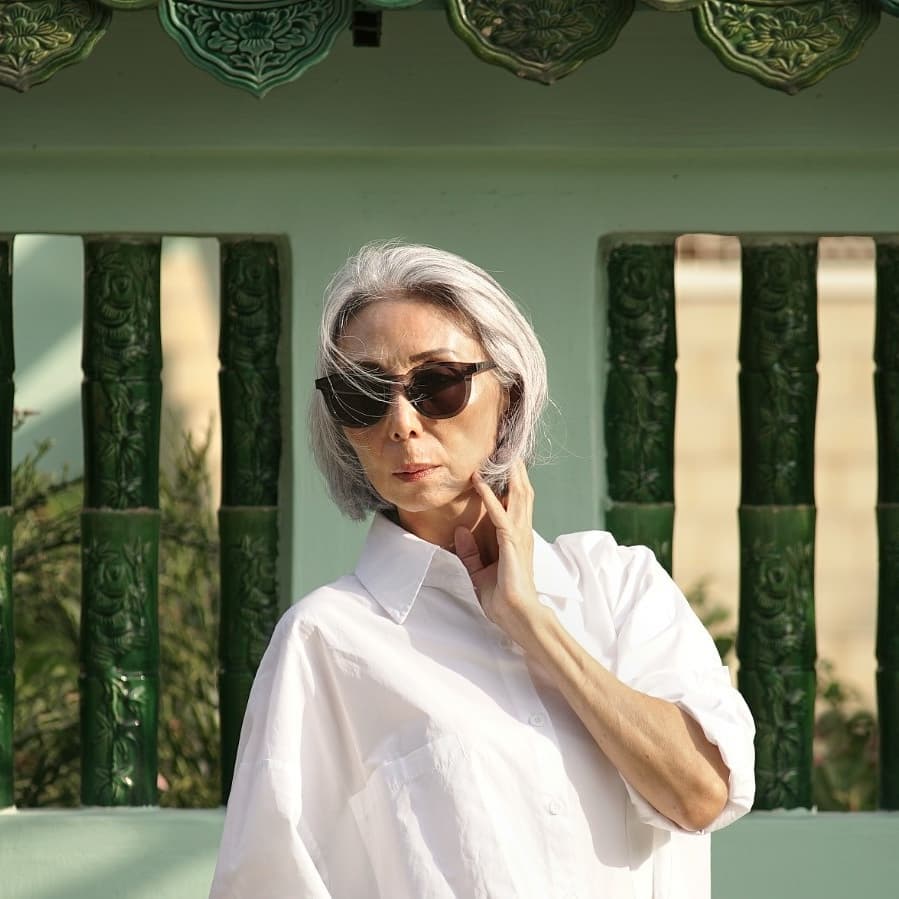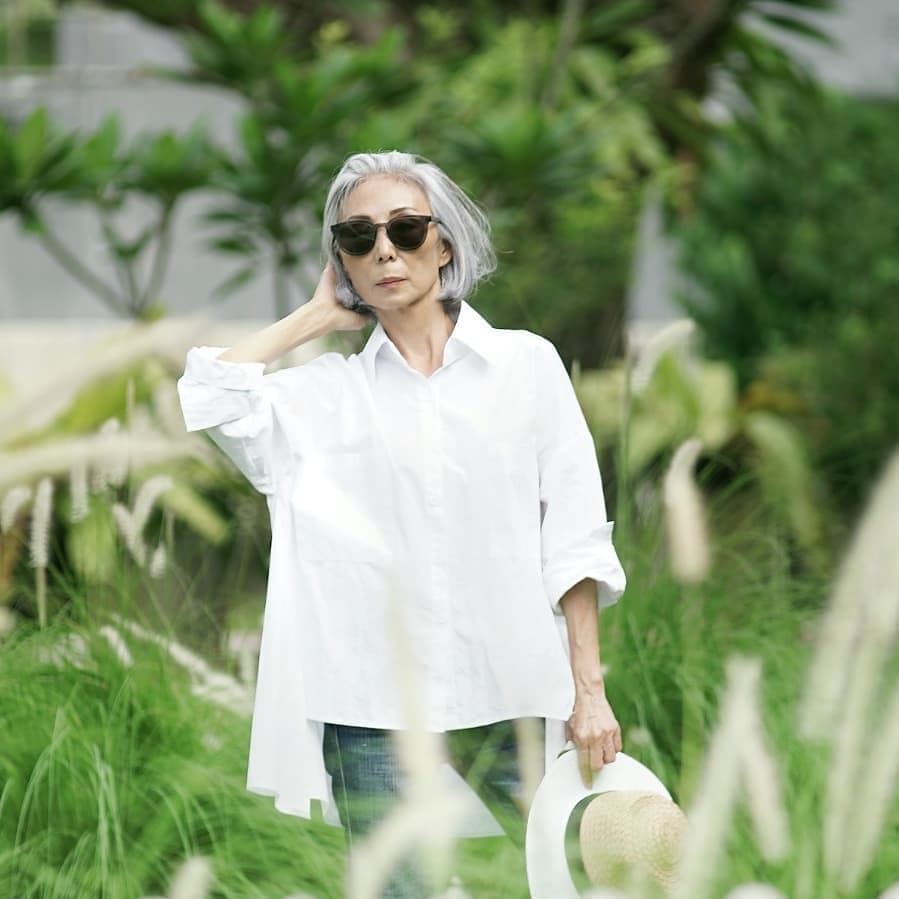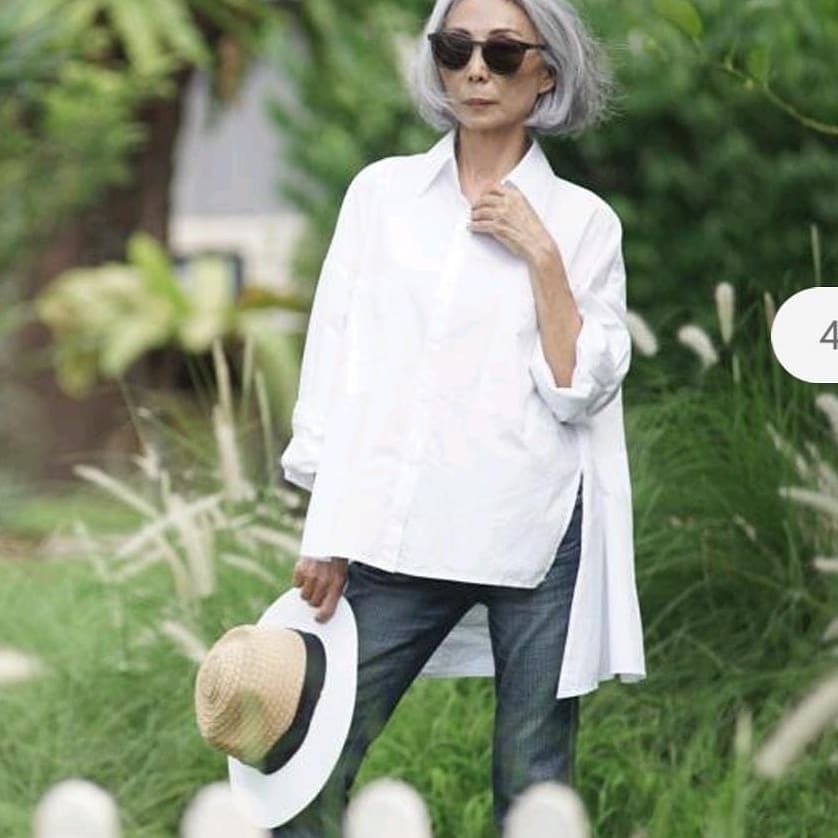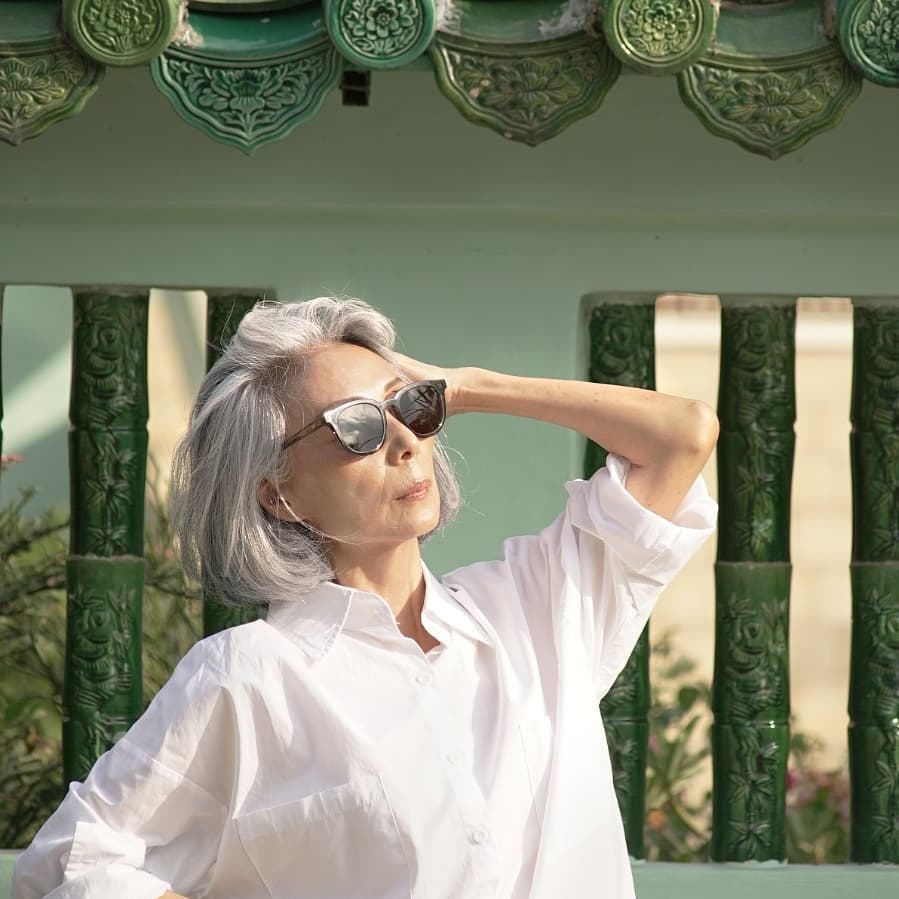I was at the hair salon one Sunday afternoon, ruminating on life and ageing, when, mid-trim, I overheard a conversation between another hairdresser and her male client. She was commenting, rather loudly, that she could see his grey hairs, and if he would consider doing a quick twenty minutes colouring job after the trim.
“All the hair white-white already. Very obvious. I colour okay?” she hollered, half-suggesting, half-commanding. The customer eventually relented.
ADVERTISEMENT
I chuckled quietly, having been on the receiving end of that conversation many times before. I’m a 37-year-old man, and while some scoff at my declaration at keeping my greys, (“You’re still so young!”, “What white hair?”, “Of course you can, lah. You’re so young, it’s not even that obvious!”), I trust what I see in the mirror as I comb my tresses back, revealing a collection of white strands that seem to spread exponentially each day.
When it comes to greying hair, people are quick to offer their unsolicited opinions, placing the topic firmly in the same camp as weight gain and clothes that don’t fit. I reckon society is less inclined to reserve judgement because these issues are easily solved with hair dye, a gym membership, or a quick shopping trip. It doesn’t help that these conditions are highly visible, thereby drawing more stares, attention, and advice that no one needs.
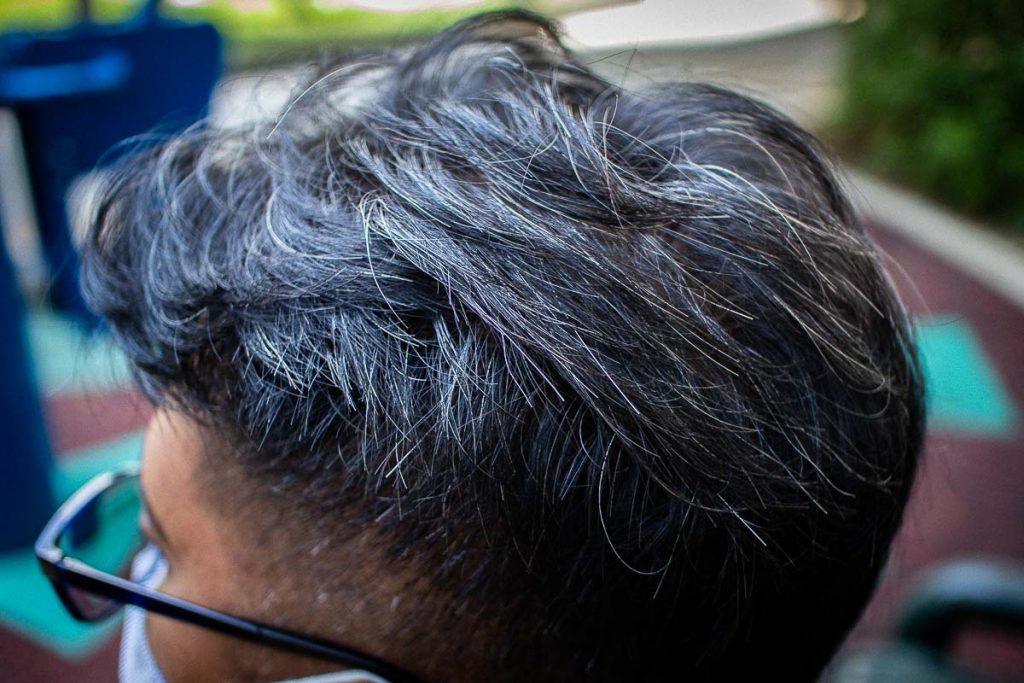
Tick-tock-you’re-getting-older, tick-tock-you’re-closer-to-dying.
But I’ve never been swayed to action by so-called well-meaning acquaintances, cruel and harsh as their comments can be. Sure, I’ve had my hair coloured and highlighted back in my foolish early 20s, but that was more in part due to the folly of youth than the reckoning of society’s judgement and the slow but sure decay of time. Tick-tock-you’re-getting-older, tick-tock-you’re-closer-to-dying.
ADVERTISEMENT
Consider the many times we’ve been asked for our age when in the company of younger individuals and acted properly coy, excusing the reticence as ‘Oh, age is just a number, after all’. Or how we loathe the impending arrival of the big 3-0, which, by the way, is the only age worthy of the three-o moniker, as if bracing for a world of wobbly knees and daily fish oil capsules.
My insouciance stems not from an over-inflated sense of self-confidence but rather from how I view ageing. I see the process of growing old as pleasantly perpetual, these lines and wrinkles on my face symbolic of the natural progression of time, reminding me of the lessons and wisdom I’ve gained as I age. These strands of white hair, this physical patina, a mere manifestation of all of life’s hardship I’ve had to endure as I transition into adulthood and eventually old age.
So why hide it?
Going white and black again
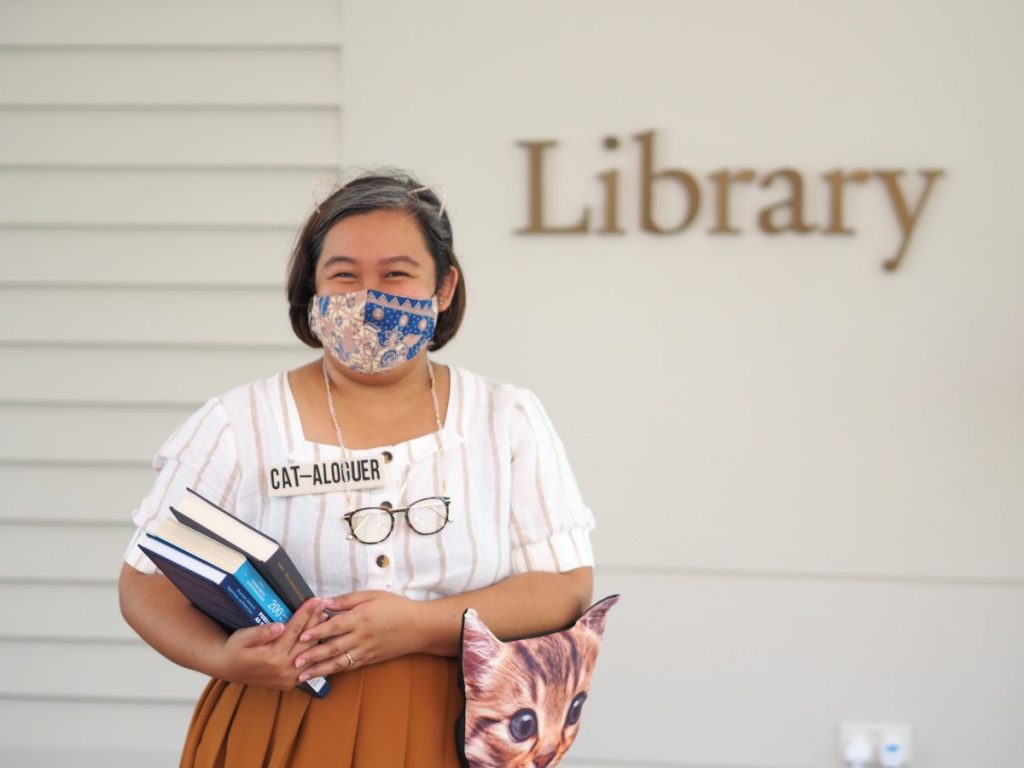
My friend, Sarah Ruslan, a 32-year-old librarian, has some thoughts to share. Back in May 2020, in the thick of Circuit Breaker, Sarah decided to embrace her greys. “All the salons were closed; I’m not going to work, no one will see me, so I thought there could be no better time. I’ve spent a decade dyeing my hair, and it’s not been kind on my scalp or my wallet. I wanted to reset.”
That lasted a whole year, as gathering restrictions were lifted, social groups reconvened, people went back to the office, and dinners resumed. Sarah, like so many others, started filling up her social calendar with the occasional tete-a-tete.
“After a whole year in seclusion, whenever I meet people, the first thing they say to me is, “Why do you have so much grey hair?” Sarah recalled. “The ones that really got to me were the older people who asked why I would want to do this to myself since I was so young. It doesn’t help that I was greying but not as fast as I wanted, so the result wasn’t exactly aesthetically pleasing.”
“Look, Zat, I know it’s just hair,” Sarah went on to share.
Sarah’s initial objective of debunking the stigma attached to women with early onset of grey hair, while noble, eventually gave way to vanity.
ADVERTISEMENT
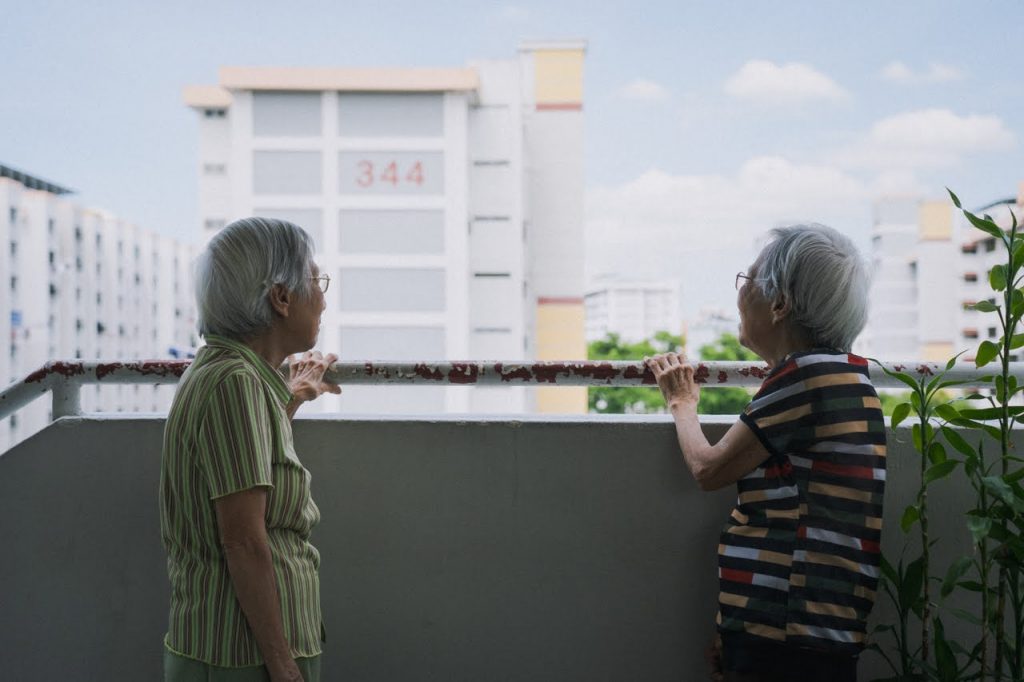
“The truth is, and I hate to say this, I still care what other people think about me,” she said rather wistfully. “I care that when I go out with my friends, I’m the only one who looks out of place.”
“Look, Zat, I know it’s just hair,” Sarah went on to share. “But as a woman, it’s tied to my womanhood and to my power. If it’s not enough that I’m a woman, I’m also brown, I’m not skinny, I’m queer, and now I stand out because of my white hair. I thought if I could pay money to blend in, why not?” Sarah shared, her voice laden with inevitable resignation.
The gender stereotypes of ageing
Something crystallised for me as I was talking to Sarah. I hadn’t realised the privileges I enjoyed as a man going through and ruminating on the journey of ageing. Society’s perception of my decision to keep my grey hairs has little to no bearing because of the different expectations people have about how men and women age.
Sophia Goh, a counsellor and psychotherapist at Sofia Wellness Clinic, tells me that it has a lot to do with how aspects of ageing are represented in mainstream media.
“Men are deemed more attractive as they tend to have more money, status, and power as they age, which allows them to more readily embrace their changes in looks,” Sophia shares over email.
“On the contrary, women are compelled to keep to the ideal standards of beauty of youthful looks to maintain their self-worth and power.”
In his book, Dataclysm, OkCupid co-founder, Christian Rudder, found that women are most attracted to men their own age while men, regardless of their age, find women in their early 20s the most attractive. It may not be immediately obvious, but it explains why women equate self-worth and power to their physical appearance as compared to men who turn to non-physical sources such as their careers for affirmation.
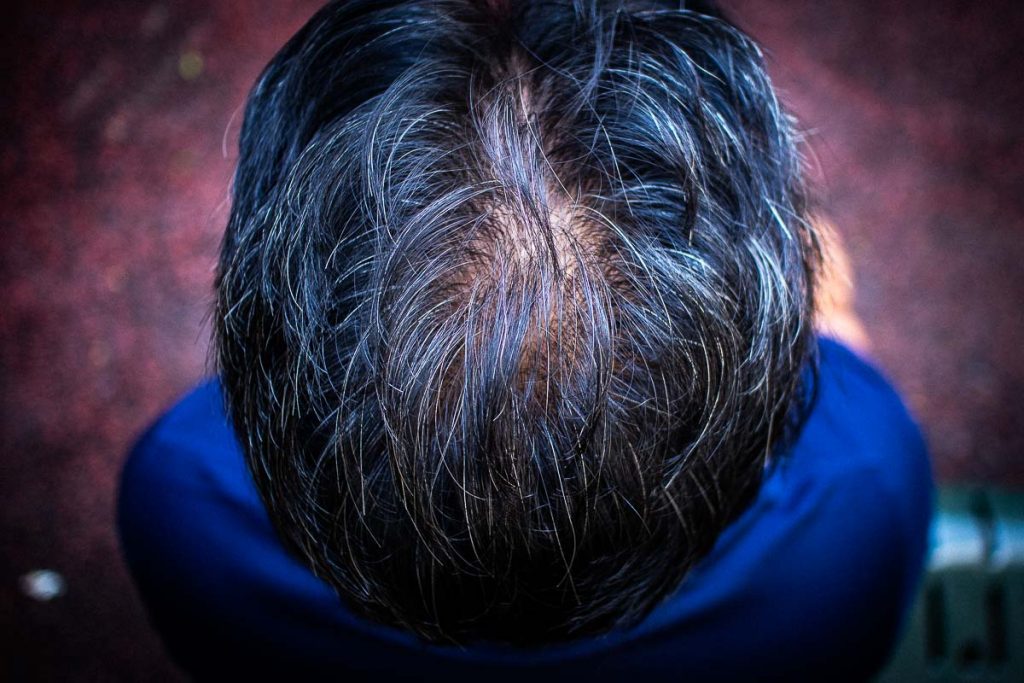
The author’s hair from the top
You’re only as old as how society makes you feel
The lack of media representation of ageing as an ideal standard of beauty further exacerbates the stereotype of drawing parallels between ageing and physical decay.
“Representations of ideal beauty in mainstream media commonly feature characteristics of youth such as supple skin and rosy cheeks. This difference between existing beauty standards and actual appearance can affect our body image negatively as we age,” Sophia explained.
A rejection of ageing can also stem from a disconnect some may feel between their bodies’ external appearance and their inner perception of self. They may still feel young and energetic but are labelled as old because of how they look—a grave perceived mismatch between their biological age and chronological age that many find hard to explain away.
The rallying cry to join the #greymovement
Perhaps it’s helpful to look at ageing from the Japanese philosophy of Wabi-sabi—an embrace of life and the self as ephemeral and fleeting. Wabi-sabi rejects all notions of perfection and posits that a transient life is the only one worth living. That it is in the imperfect that the self finds meaning, eschewing burdened thoughts of never feeling good enough or, God forbid, letting society define what fulfilment and happiness should look like.
When looked through the lens of Wabi-sabi, ageing then becomes a thing of beauty that never, ever stops being alluring.
If it helps, remember that hair turns grey because our hair follicles produce less colour as they age. In the process of cells dying and regenerating, the further along we age, the greyer our hair becomes. It’s nowhere near a cataclysmic turn of events. It’s just the body’s way of signalling the move into an age of wisdom and a visual indication of a life well-lived.
Reclaiming your power with wholehearted living
It’s unavoidable—we will all age, and then we will all die. But, in all that time between, there is a multitude of things you can do to partake in a life that’s enriching and meaningful instead of sitting in a chair at a salon for three hours, bleeding both your scalp and wallet dry.
Rather than bemoaning the physical patina of ageing, look for other ways to reclaim that power. Sophia shares that it would be helpful to explore what we are holding on to from our youth that’s making it hard to embrace the physical, mental, and emotional effects of ageing.
“While it is true that our bodies are different as we age and that we cannot do everything that we used to when we were younger, we can still seek these intrinsic values in different ways,” Sophia explained.
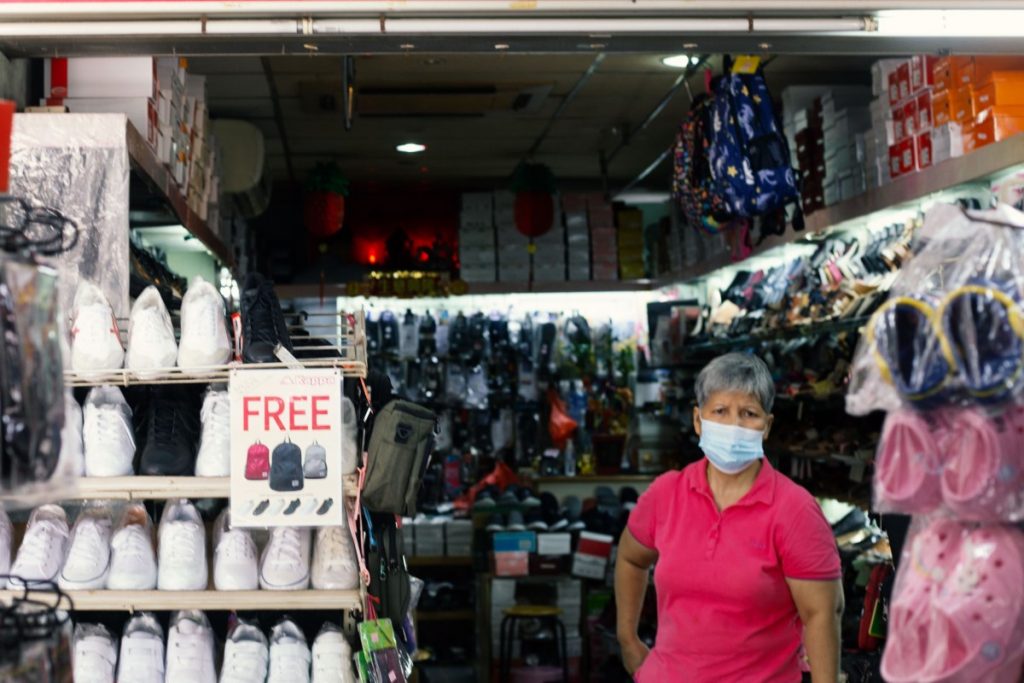
“If what we miss is the sense of adventure, we can try being open to new activities and learning new things. If what we miss is being bold and confident, we can experiment with new hairstyles or fashion accessories.”
I wonder, then, if a rejection of ageing in our later years could be avoided entirely altogether if we are told, no, commanded, to live firmly in the present. To smell the roses, if you may, instead of constantly fretting about the past and the future—abstract concepts that we can no sooner control than death itself.
Research professor Brene Brown has a name for this: Wholehearted living.
“Wholehearted living,” Brown shares, “is about engaging with our lives from a place of worthiness. It means cultivating the courage, compassion and connection to wake up in the morning and think, ‘No matter what gets done and how much is left undone, I am enough’.”
Having lived our present life to its fullest with zero regrets then becomes the prescription to a future possibility of dreading growing old because what’s there left to agonise over or regret if everything we’ve ever wanted to accomplish is already fulfilled?
Putting it all together
If you’re still on the fence, maybe what Ong Bee Yan has done would tip the scale.
65-year-old Yan is a part-time model, mother, and grandmother who has appeared on the cover of Harper’s Bazaar, her full head of greys on display for the whole world to marvel. This elderpreneur is also the founder of 1degreeC, a cold brew coffee and tea outfit that she set up with her husband, Richard Koh.
I asked Yan what ageing means to her. “Ageing is about being content and happy with life,” she shared. “Ageing is about paying it forward to help the community as much as you can, especially if, like me, you believe you’ve achieved everything you’ve ever wanted.”
Yan’s foray into modelling came about when she was approached by a designer and asked to be featured as an ‘ordinary people’ model.
“Then, I was dealing with the rut of low self-esteem. But I thought if this young lady, this stranger believes in what I can do, why can’t I have more faith in myself? Can you believe that I used to hate taking photos? Now look at me,” Yan said, laughing at the silliness of it all.
Seeing peers make repeat visits to the salon to touch up their roots reminds me so much of how my mum, who, even now at the ripe age of 58, takes pains to colour her hair black. Sometimes, I catch my dad in the act, too. But I’ve realised that not doing anything to change your hair’s natural greying state is not a symbol of neglect or surrender. It’s simply looking at perfection from a more realistic and reasonable lens and understanding that when it comes to white hair, it helps to be a little colour blind.
Tell us what you thought of this story at community@ricemedia.co. And if you haven’t already, follow RICE on Instagram, Spotify, Facebook, and Telegram.
